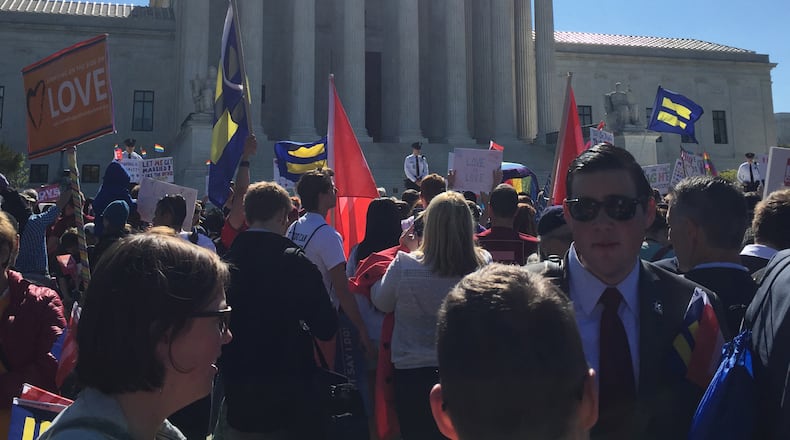The Supreme Court said today, in a 5-4 ruling , that the 14th Amendment affords same-sex couples the right to marry, anywhere and everywhere in the United States. This is a sensitive topic for many people, one that will unleash a range of emotions. But one cannot fully grasp how sweeping -- radical is another word -- this decision is without reading it.
To summarize: There is no limiting principle regarding the redefinition of marriage in this ruling. None whatsoever. While the ruling for now only legalizes marriages between same-sex couples, the soaring rhetoric Justice Anthony Kennedy summons in what he surely considers his magnum opus leaves the door wide open to any other kind of relationship that gains popularity in time.
Citing the 14th Amendment's protection of "life, liberty (and) property," Kennedy writes:
"(T)hese liberties extend to certain personal choices central to individual dignity and autonomy, including intimate choices that define personal identity and beliefs."
He later adds:
"The nature of injustice is that we may not always see it in our own times. The generations that wrote and ratified the Bill of Rights and the Fourteenth Amendment did not presume to know the extent of freedom in all of its dimensions, and so they entrusted to future generations a charter protecting the right of all persons to enjoy liberty as we learn its meaning. When new insight reveals discord between the Constitution's central protections and a received legal stricture, a claim to liberty must be addressed."
While a substantial proportion of Americans have come to believe "freedom in all of its dimensions" includes the right of same-sex couples to marry, nothing about this language limits it to couples. No matter how many times Kennedy refers to "two persons" or "same- and opposite-sex couples," those are merely descriptions of the "new insight reveal(ed)" in this particular instance. The opening Kennedy and the majority make to these couples simply awaits the next plaintiff appealing to the right to "individual autonomy" as it relates to choosing a marriage partner or partners. One does not, for example, have to believe same-sex relationships are equivalent to three- or four-person relationships -- I would not say they are -- to see the court has not just cracked the door open to other definitions of marriage but flung the door off its hinges.
Perhaps that is the concept of liberty that Americans, or "future generations" of Americans, accept. (Though I suspect we will see court cases arguing these "future generations" are in fact concurrent with the present one.) But that is not exactly how the present argument was sold, even if the way the argument was equally open-ended.
So we are left with this question: Will a movement dedicated to extending the dignity of an exclusive institution wind up rendering that institution so inclusive as to confer little dignity at all? And if so, what was the point?
***
As for the immediate effects of the ruling: The law is the law ( yesterday's contortions of the Roberts court to say the law is not really the law notwithstanding) and state and local governments in Georgia and elsewhere should follow it as such. If there is going to be defiance cloaked as civil disobedience, let it be done outside our state's borders.
However, we will also find out if the libertarian cavalry, so to speak, is really going to arrive on the scene. By which I mean, we will see whether promises will be kept that this is truly an example of "live and let live," and that "let live" will truly apply to dissenters who happen to work in, say, the wedding industry. We have been told by many libertarians and even some of our liberal friends that freedom requires the expansion of marriage rights to same-sex couples as well as allowing others to decline to participate in such wedding ceremonies for religious reasons. The 14th Amendment does, after all, include the protection of "property."
Will those who advocated in full voice for this outcome be equally dedicated to protecting those who would dissent from it? Would the Supreme Court uphold laws passed to that end? With the end of one large question, we can easily see the advance of many other questions.
About the Author
Keep Reading
The Latest
Featured


